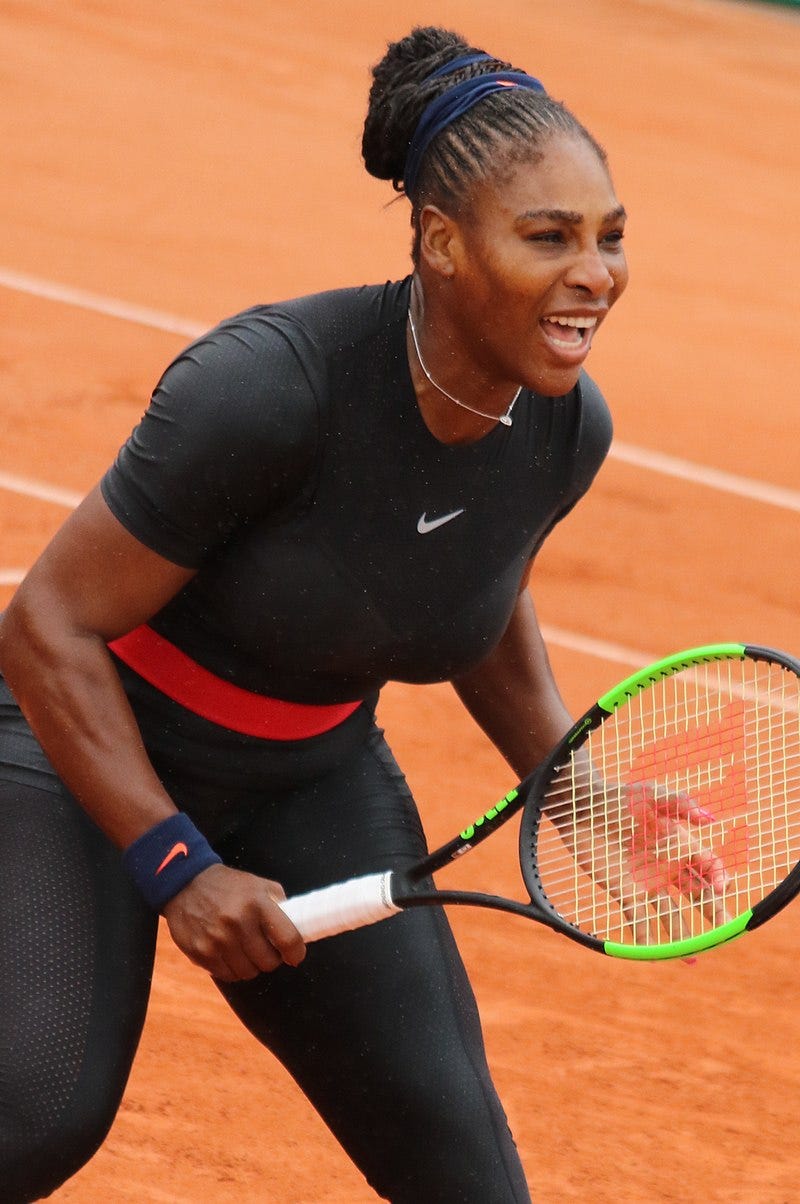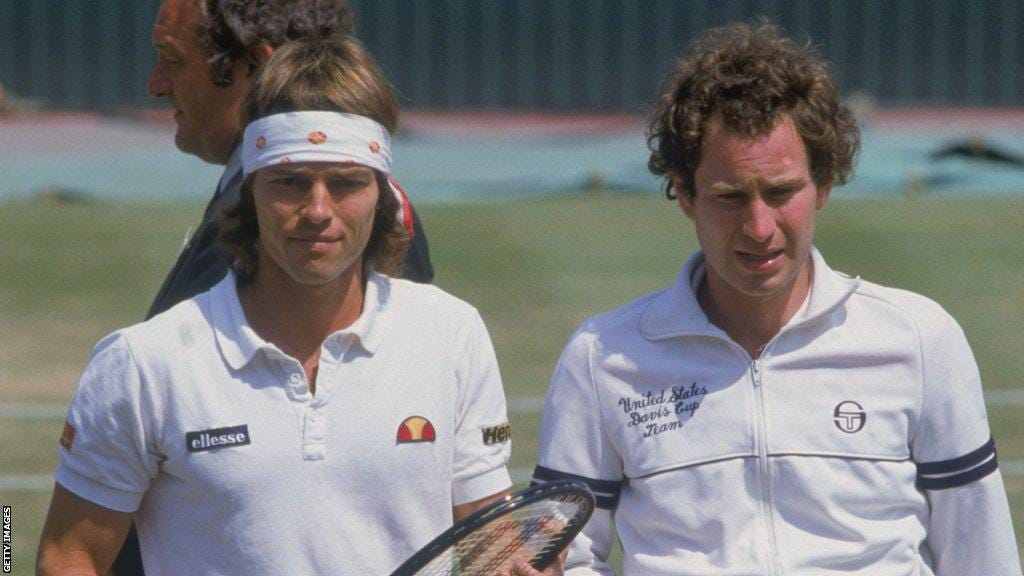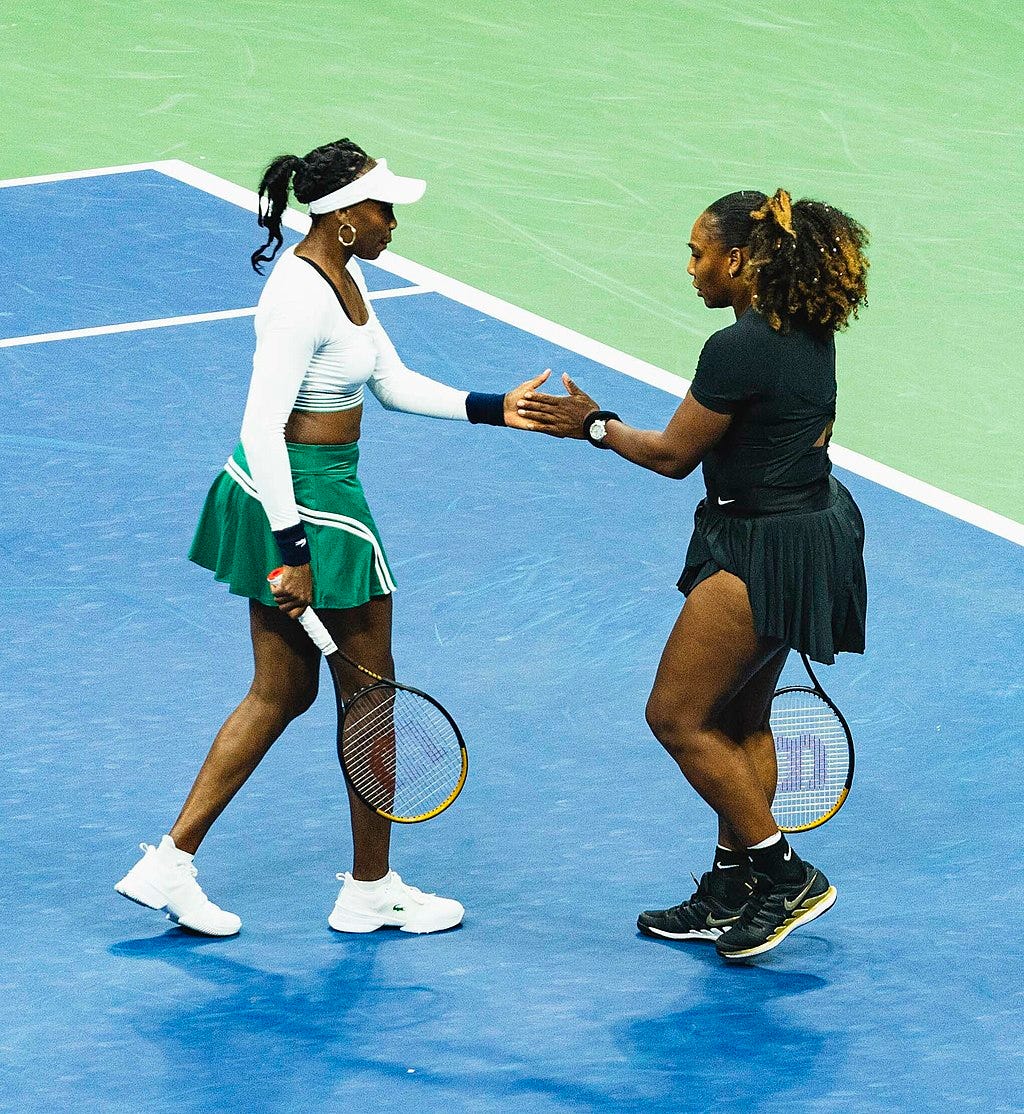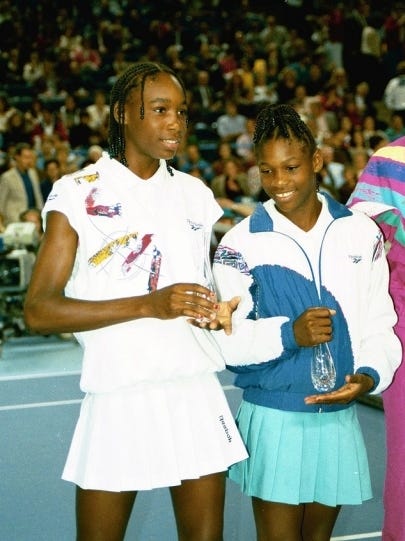NOTES FROM THE SOFA: WIMBLEDON & SERENA WILLIAMS
BALLS PLEASE! WATCHING (NOT PLAYING) TENNIS ON TV
Simply the best… Serena training on clay.
When writing about Glastonbury Festival on the Yak I mentioned how the 18 days from Glastonbury’s opening through to the crowning of the winner of the Men’s Singles at Wimbledon is surely an annual high-point for the English middle-upper classes.
Some might suggest “British” but I’m unsure if the Scots and Welsh ever get very enthused about these epic English summer events – the controversy surrounding Kneecap’s performance at Glastonbury surely meant more youthful Northern Irish viewers were tuning in, but did they watch anyone else? And would they watch Wimbledon? I doubt it.
But for the comfortably off English, this season of strawberries and cream and jugs of Pimms, alongside endless TV coverage of famous pop-rock singers then famous tennis players, truly is heaven on earth.
Growing up in a former British colony ensured Wimbledon was one of the high points of mid-winter – suddenly the nation tore its collective eyesight away from watching muddy rugby matches and stared at the TV for hours on end as balls were bashed across nets.
My parents loved to watch tennis – actually, my dad loved to watch pretty much all sports, but tennis was the one I think he enjoyed most. Which meant from early childhood I got to watch Wimbledon – back then NZ only had one TV channel and, on our black & white set, we would, as a family, watch hours of Wimbledon.
Did they show the matches live? I can’t imagine so – getting up in the middle of a winter night to watch a couple of hours of tennis then going back to sleep before rising at 7am to go to work? If they did then perhaps it was only my family – and a few other tennis crazed ones – that did.
Kiwis’ aren’t very good at tennis, unlike our neighbours across the Tasman, and I never knew anyone who played this odd, disjointed (15-love, 30-love, 40-love…) game seriously. Unlike rugby - then and now the true religion of Aotearoa.
No matter, my family consumed hours of Wimbledon and I can still recall the names of the champions back then – Jimmy Conners and Arthur Ashe were the US stars while Romania’s bad tempered Ilie Năstase and Sweden’s ice cool Bjorn Borg were iconic athletes, contrasting with their very different styles.
Australia’s Evonne Goolagong stood out as she was an Aboriginal – even as a child I knew that few Aboriginals ever enjoyed any kind of mainstream success. I imagine I considered Yvonne as akin to our Kiri Te Kanawa: the exception, not the rule.
Lewis & McEnroe: a quiet Kiwi versus a loud Yank - guess who won?
Actually, I recall watching the one Kiwi to reach a Wimbledon final, Chris Lewis, getting hammered by John McEnroe in his prime. Chris was handsome and calm, while John was ugly and bratty, but no one ever said nice guys finish first.
Adolescence meant I lost interest in watching TV with my parents and, while I played tennis, I never took it seriously – I don’t have that hunger to “win” and much preferred to just bash the ball about rather than compete.
Still, in the decades since I’ve maintained an interest in who are the formidable champions – Germans’ Boris and Stefi both dominating the early 90s, then Andre Agassi being a very colourful character (all that hair and – suddenly - no hair!).
The era of giants took hold as Roger and Rafa began duelling it out – I always preferred Rafa, he just dug in and played with such sweaty intensity. As someone who has to grind out whatever I do, I related to Rafa’s stoic endurance over Roger’s smooth perfectionism.
Also, once retired, my dad used to volunteer as a driver at the ATP Open (Auckland and thus Aotearoa’s only international tennis event) and he said Rafa was the politest of all the players he drove. Good manners might not make you a winner but they do ensure you are appreciated.
While with the Ladies – as Wimbledon still refers to female players – Stefi was replaced by Martina Hingis, a skilful Czech teen who became the youngest female Slam winner and likely thought she was now going to dominate for a good while. Then came Venus and Serena Williams and they quickly changed women’s tennis forever - Hingis retired due to “ligament” injuries aged only 22.
Sisters doing it for themselves.
I mention this because the sisters captivated me like no tennis players previously (or since) – straight outta Compton, they blew up tennis in a manner comparable to how NWA detonated rap.
I was enamoured by everything about them: the way they played, the personal style they conveyed, their strength and grace – where a lot of top tennis players speak as cyborgs, having little to say beyond commenting on their on court performance, the Williams sisters obviously understood life beyond tennis.
Venus was my favourite: I still have a photo of her on my office wall, she’s holding the Wimbledon shield after she won it for the first time, smiling that huge, gorgeous smile of hers. Absolutely fabulous.
And then Serena took over, becoming the GOAT. Where Venus moved like a dancer – those graceful long limbs – Serena fought like a boxer – hitting shots so hard they appeared to concuss her opponents, leaving them dazed and confused.
Where Venus never lost her cool, Serena had a touch of the McEnroe’s, shouting at umpires, smashing racquets and brooding. Venus once commented on her little sister’s behaviour, saying she was the baby of the family so always got what she wanted. Thus the hissy fits when things didn’t go her way. But, for a long time, they did – she dominated women’s tennis.
Here’s a 7-minute sampler of In The Arena: if you like it, well, there’s hours to watch.
And this domination is why I decided to glance at Serena Williams: In The Arena on BBC iPlayer. All eight episodes of 44 minutes – that’s six hours of TV on a tennis player… – it seemed excessive and I told myself I’d maybe watch the first episode. People, I viewed every minute!
Admittedly, I had enjoyed King Richard – the biopic about Richard Williams and his determination to turn his two youngest daughters into world beaters (this is one of the few decent biopics out there, largely because its not a story we know well and Will Smith’s Williams is not an iconic rock star, more a driven, difficult eccentric with a touch of the visionary about him; Smith deserved his Oscar, just a pity him slapping Chris Rock overshadowed the film).
And I surprised myself at watching the Netflix series Beckham: a friend whose judgement I trust recommended it so I sampled and, hey, I was hooked. So maybe I’m a sucker for big and small screen celebrations of sporting icons?
Like Beckham, Serena Williams: In The Arena is produced by the superstar athlete and thus these series only tell the “official” story – no warts at all. But Serena and Venus’ story is truly an “only in America” one and the sisters’ make for engaging interviewees: grounded, thoughtful, good humoured.
I enjoyed the trivia - Serena was a teenage skateboarder and punk rock fan, hey! - alongside the intense focus their father instilled in them. The talking heads are largely female and family or employees (sisters, agents).
Venus appears a great deal but doesn’t offer the kind of insight I quoted above, that having been uttered when they were still competitors. I was surprised their mother appeared only briefly - its very much the Serena show, she’s interviewed intensely about every big win (or injury).
Admittedly, the series could lose two hours - things get really repetitive (another grand slam, another injury) - but Serena has a certain magnetism that kept me watching (as she did on court). I wonder if she will ever consider politics or activism? There’s a gravitas about her that I think might command attention.
Fellow competitors she disliked in the dressing room get their comeuppance here – Martina Hingis will hiss when she learns she’s portrayed as a maliciously bad loser – and Serena’s comment after losing the Wimbledon final in 2004 to Maria Sharapova is revealing: “I swore that I would never ever, ever, ever, ever lose to her again” (she lost their next encounter then won every other match).
Actually, anyone who crossed Serena appears to have fed her determination to be champion: she mentions her first adult relationship taking place in NYC after a US Open and then she returns to LA and the guy ghosts her. She determined then that he would remember her name cuz homegirl was now determined to keep winning.
While Serena’s sometime outbursts on court aren’t really addressed, its mentioned more than once how she thrived on chaos and friction, seemingly letting rage fuel her play. Which is surely why she mentions disliking playing Venus, her sister being her bestie. In their matches she was unable to let her furies vent.
Once upon a time in LA…
As the sisters often emphasise, they were outsiders in a game where competitors were expected to be white and glossy and from wealthy suburbs. Which is why they stood out – and the racism aimed at them and their father (especially at the notorious Indian Wells tournament, held in a very wealthy Republican enclave) shows how toxic the US psyche can be (this is before Trump’s elections; now such behaviour would likely be encouraged by the White House).
Watching Wimbledon across this past fortnight, Serena and Venus are missed – there are no characters who come anywhere near them in terms of personality and style. Only Djokovic, who displays (at times) an acerbic personality and is anti-vax (+ other weird conspirashit stuff), stands out from the skilful cyborgs. Novak is an exceptional athlete – arguably the greatest tennis player ever – but not one the world has warmed to (outside of Serbia).
While Aryna Sabalenka, who is No 1 women’s player and lost over three tough semi-final sets on Thursday to Amanda Anisimova, is something of a Belorussian blend of the sisters – her statuesque physique and brooding intensity – with a pinch of Hingis (a sour loser). But where Venus and Serena were fascinating and open and – at times – charming, Sabalenka is a Terminator, formidable but not a player to warm to.
Emma Raducanu grew up in Bromley, a staid suburb of greater London once home to David Bowie. Of Chinese-Romanian parents, she represents a new England, just as Venus/Serena showcased a changing USA - tho’ Bromley’s no Compton.
I mentioned earlier in this piece how the English middle-upper classes love Wimbledon, tennis being a game played by those who live in leafy suburbs (amongst my adult pals there are two who love to play tennis and both attended private schools).
This means the BBC and the newspapers devote intense coverage to any British hopefuls. Only Scot Andy Murray delivered, winning Wimbledon in 2013 and 2016, after decades of nearly every other nation producing superior players.
This year Jack Draper was promoted as surely getting to the semi-finals (but was wiped out by Martin Čilić, the veteran Croat player, in his second match) while Emma Raducanu, the teenage prodigy who somehow won the US Open and has never since come near reaching such heights again, only got one stage further. Both are photogenic and personable so will, in a year’s time, be talked up again as possible “winners”.
Tennis is an odd game, never more so than at Wimbledon with its “all whites” rule and royals in the box and other such archaisms. I switched off Carlos Alcaraz’s semi-final as it became the routine of big serves from both players making the match very close yet rarely exciting.
Which begs the question: is tennis often “exciting”? Its more a game of pauses, polite yet taciturn players, often dominated by serve… unless there’s an interest in an individual player the game can be as dull to watch as snooker. Just with grunts. And skirts. So why do I watch Wimbledon?
I sometimes consider this, wondering what I’m doing wasting an afternoon on the sofa staring at the telly – maybe the spirit of my father sits alongside me, muttering “good shot” like a mantra for hours on end …. OK dad, Alcaraz for the title!
Aryna Sabalenka at work (obviously not playing at Wimbledon). Those thighs!
Final note: I went to see Stevie Wonder in Hyde Park this afternoon so missed the Wimbledon Ladies’ Final (a 6-0,6-0 wipeout). Thank you, Stevie, for ensuring I didn’t waste my time. Maybe next year I simply won’t turn the telly on? Old habits are hard to break so let’s see.










Game, set and match!
What you mentioned there Garth about the difference in attitude towards tennis over on my side of the Tasman made me think how common the game was part of my life in Australia. We had some tennis courts, complete with lights, that were used practically nonstop and rarely, if ever, were vandalised. My high school had a tennis team that did very well. My brother had a thing for tennis and played competitively for the local tennis club. That was the same club that Australian professional tennis player Alice Molik played for, who was a primary school friend of my sister's. My family is only two steps away from Lleyton Hewitt, who as a child lived next door to a lovely Macedonian family (friends of ours, of course), the mother of which would look often treat her little "Leytonche" to plenty of Macedonian food.